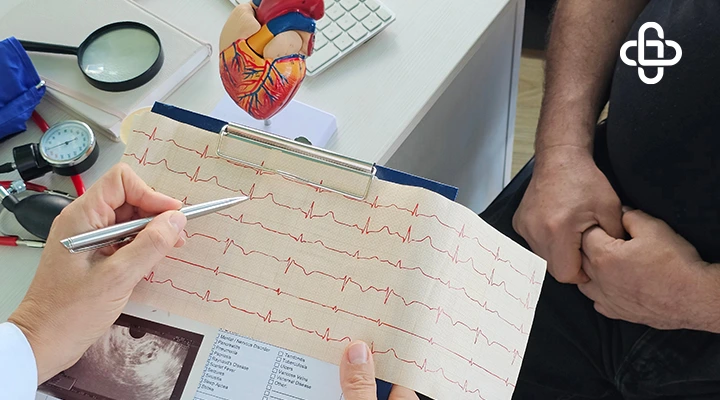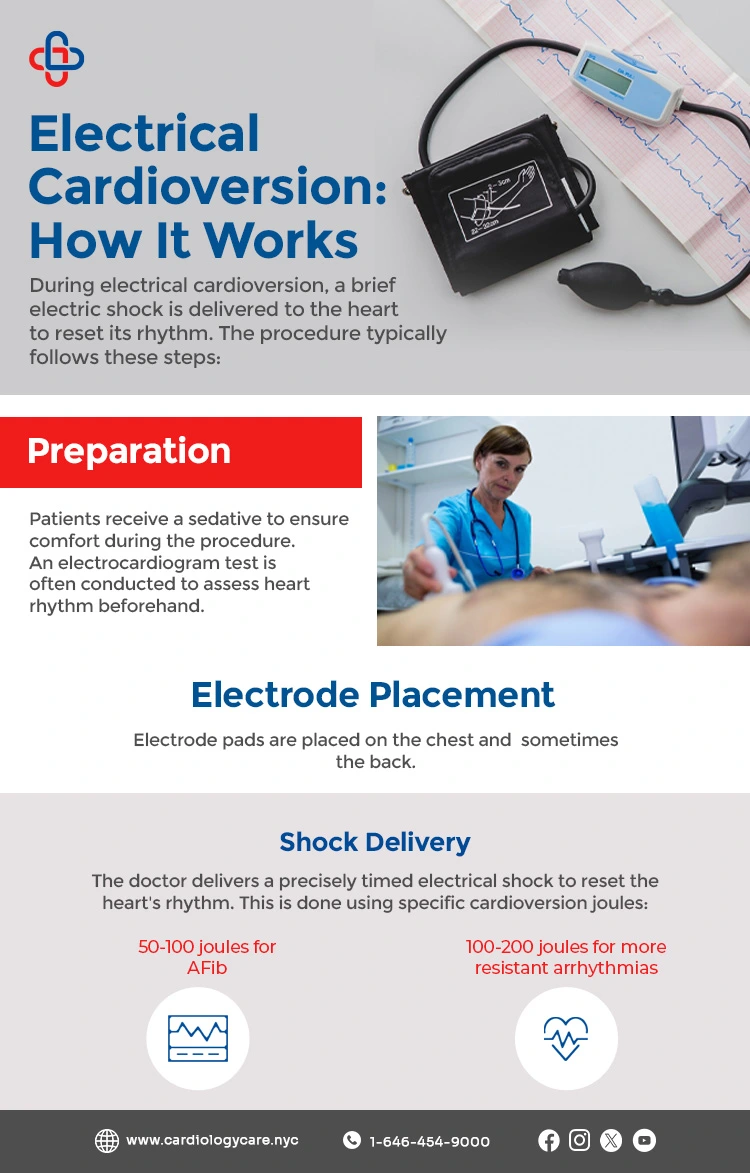If you have an irregular heartbeat like atrial fibrillation (AFib), cardioversion may be an effective treatment. A cardiology consultation can help determine if it’s right for you. Cardioversion is a proven method to restore normal heart rhythm, relieving symptoms such as palpitations, fatigue, and dizziness while reducing the risk of stroke and heart failure.
Table of contents
What Is Cardioversion?
Cardioversion is a medical procedure used to correct abnormal heart rhythms (arrhythmias) by delivering controlled electrical energy or medications to the heart.
Types of Cardioversion
- Electrical Cardioversion: This method uses carefully measured electrical energy (measured in cardioversion joules) to restore the heart’s normal rhythm.
- Chemical Cardioversion: This alternative approach relies on antiarrhythmic medications to correct the heart’s rhythm without an electric shock.
Conditions Treated with Cardioversion
Cardioversion is commonly used to treat:
- Atrial Fibrillation (AFib)
- Atrial Flutter
- Supraventricular Tachycardia (SVT)
Electrical Cardioversion: How It Works
During electrical cardioversion, a brief electric shock is delivered to the heart to reset its rhythm.
The procedure typically follows these steps:
- Preparation: Patients receive a sedative to ensure comfort during the procedure. An electrocardiogram test is often conducted to assess heart rhythm beforehand.
- Electrode Placement: Electrode pads are placed on the chest and sometimes the back.
- Shock Delivery: The doctor delivers a precisely timed electrical shock to reset the heart’s rhythm. This is done using specific cardioversion joules:
- 50-100 joules for AFib
- 100-200 joules for more resistant arrhythmias
What Is Synchronized Cardioversion?
Synchronized cardioversion times the electrical shock to the heart’s R-wave on an ECG, reducing the risk of inducing a dangerous arrhythmia.
Chemical Cardioversion: An Alternative Treatment Option
Chemical cardioversion uses medications instead of electrical shocks to stabilize the heart’s rhythm. Common antiarrhythmic medications include:
- Amiodarone
- Flecainide
- Propafenone
This method is often ideal for:
- Patients who may be at higher risk during electrical cardioversion.
- Individuals with mild or intermittent arrhythmias.
Is Cardioversion Safe? Understanding the Risks
Cardioversion is generally safe and effective, with a high cardioversion success rate. However, like any procedure, it carries some risks:
- Blood Clots: Blood thinners may be prescribed before and after the procedure to minimize this risk.
- Skin Burns: Mild irritation at the electrode site is possible but uncommon.
- Arrhythmia Recurrence: Some patients may require follow-up treatments.
Can You Die During Cardioversion?
While complications are rare, patients often ask, “Can you die during cardioversion?” Death during cardioversion is extremely rare, especially with proper medical screening and preparation.
What Should You Not Do After Cardioversion?
After cardioversion, your doctor will recommend certain precautions to ensure a smooth recovery:
- Avoid driving for at least 24 hours due to sedation effects.
- Refrain from intense physical activities until your doctor advises otherwise.
- Monitor your heart rate and symptoms closely for any signs of rhythm changes.
How to Stay in Sinus Rhythm After Cardioversion?
To maintain a normal heart rhythm after the procedure:
- Follow your doctor’s medication regimen, especially prescribed antiarrhythmic medications.
- Reduce stress and maintain a heart-healthy diet.
- Attend regular heart health screening appointments to monitor your heart condition.
Life After Cardioversion
Many patients experience immediate symptom relief following cardioversion. However, long-term care is essential to sustain heart health. This may include:
- Blood thinners to reduce stroke risk.
- Antiarrhythmic medications to stabilize your heart’s rhythm.
- Regular cardiovascular screenings to monitor your heart’s condition.
If you continue to experience symptoms such as dizziness, palpitations, or fatigue, consult your cardiologist for guidance on next steps.
Cardioversion vs Defibrillation: What’s the Difference?
It’s common to confuse cardioversion vs defibrillation, but these are distinct procedures:
- Cardioversion treats organized arrhythmias like AFib or atrial flutter in a controlled hospital setting.
- Defibrillation is an emergency procedure used to treat life-threatening arrhythmias such as ventricular fibrillation or cardiac arrest.
In some cases, DCCV cardiology (Direct Current Cardioversion) may be recommended for more severe or persistent arrhythmias.
Conclusion
Cardioversion is a safe and effective treatment for restoring normal heart rhythm in people with AFib or other arrhythmias. While risks are minimal, understanding post-procedure care and lifestyle changes can significantly improve your long-term heart health.
If you’re concerned about your heart rhythm or considering cardioversion, consult your doctor or contact Cardiology Care NYC for expert guidance and personalized treatment options.
Frequently Asked Questions
Can lifestyle changes reduce the need for cardioversion?
Yes, adopting a heart-healthy diet, exercising regularly, and managing stress can help improve heart rhythm stability, potentially reducing the need for cardioversion.
Are there alternative treatments if cardioversion is unsuccessful?
If cardioversion fails, treatments such as catheter ablation, pacemaker implantation, or advanced medications may be considered.
How long does the effect of cardioversion last?
The duration of normal rhythm post-cardioversion varies. Some patients maintain sinus rhythm for years, while others may require additional treatments.
Can cardioversion be performed in an emergency?
Yes, electrical cardioversion is sometimes used urgently to correct dangerous arrhythmias in critical situations.
Disclaimer
This blog is for informational & educational purposes only and does not intend to substitute any professional medical advice or consultation. For any health-related concerns, please consult with your physician, or call 911.

